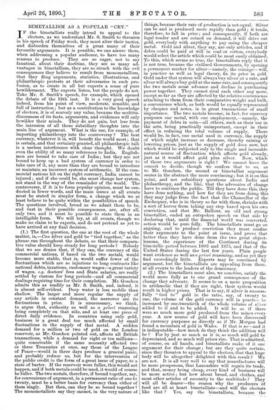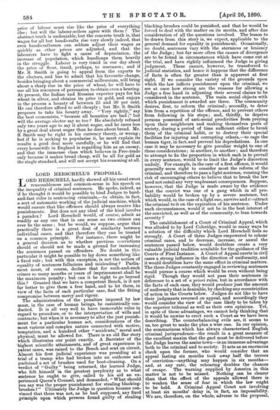BIMETALLISM AS A POPULAR "CRY."
IF the bimetallists really intend to appeal to the electors, as we understand Mr. S. Smith to threaten in his speech of Friday week, they must alter their tactics, and disburden themselves of a great many of their favourite arguments. It is possible, we can assure them, when addressing a popular audience, to have too many reasons to produce. They are so eager, not to say fanatical, about their doctrine, they see so many ad- vantages in bimetallism, they are so struck with the evil consequences they believe to result from monometallism, that they fling arguments. statistics, illustrations, and philanthropic protests at their adversaries in such pro- fusion, as to create in all but experts a sense of pure bewilderment. The experts listen, but the people do not. Take Mr. S. Smith's speech, for example, which opened the debate of the 18th inst. It is a very good speech indeed, from his point of view, moderate, sensible, and full of instruction ; but as a contribution to the knowledge of electors, it is of scarcely any value, because the multitu- dinousness of its facts, arguments, and evidences will only bewilder their minds. They do not gain, but lose from the intrusion of all those subsidiary thoughts into the main line of argument. What is the use, for example, of importing philanthropy into the controversy ? The best currency, whatever it is, will benefit the world most ; that is certain, and that certainty granted, all philanthropic talk is a useless interference with clear thought. We doubt even the utility of so many references to India. English- men are bound to take care of India ; but they are not bound to keep up a bad system of currency in order to take care of it, any more than they are bound to introduce or maintain an incorrect system of arithmetic. If the com- mercial nations hit on the right currency, India cannot be injured ; and if she could be, she must change her system, not stand in the way of the remainder of the world. The controversy, if it is to form popular opinion, must be con- ducted in fewer words, and the main issues at all events must -be stated in simpler form, a change which we at least believe to be quite within the possibilities of speech. The questions involved, broad as we admit them to be, and vast in their possible consequences, are, after all, only two, and it must be possible to state them in an intelligible form. We will try, at all events, though we make no claim to be experts, and do not pretend as yet to have arrived at any final decision.
(1.) The first question, the one at the root of the whole matter, is,—Can silver and gold be "tied together," as the phrase ran throughout the debate, so that their compara- tive value should keep steady for long periods ? Nobody that we see denies that, if they can, the currency of the commercial nations, if based on the two metals, would become more stable, that is, would suffer fewer of the fluctuations which are so injurious to long contracts like national debts, taxations, customary wages—a great variety of wages, e.g. doctors' fees and State salaries, are really settled by custom for long periods—and all commercial dealings requiring time for their completion. Mr. Goschen admits this as readily as Mr. S. Smith, and, indeed, it is almost self-evident. Deep water is less mobile than shallow. The larger and more regular the supply of any article in constant demand, the narrower are its fluctuations in price. It is unnecessary, we think, to argue that, authority as well as a priori reasoning being completely on that side, and at least one piece of direct daily evidence. In countries using only gold, business is a great deal too much affected by small fluctuations in the supply of that metal. A sudden demand for a million or two of gold on the London reservoir, as Mr. Goschen pointed out, affects all British transactions, while a demand for eight or ten millions— quite conceivable if the same necessity affected two or three Treasuries at once, say those of the League of Peace—would in three days produce a general panic, and probably reduce us, but for the intervention of the public credit in the form of a great issue of paper, to a state of barter. If the reservoir were fuller, this would not happen, and if both metals could be used, it would of course be fuller. The two metals, therefore, if bound together, say, for convenience of argument, in a permanent ratio of one to twenty, must be a better basis for currency than either of them singly. But then, can they be so bound together ? The monometallists say they cannot, in the very nature of things, because their rate of production is not equal. Silver can be and is produced more rapidly than gold ; it tends, therefore, to fall in price ; and consequently, if both are legal tender and are coined on demand, it will drive out gold, everybody with anything to pay using the cheaper metal. Gold and silver, they say, are only articles, and if debts could be paid at will in coal or cotton, everybody would select the article which could be most easily obtained. To this, which seems so true, the bimetallists reply that it is not true, because the civilised Governments, by opening a permanent market for silver—namely, the coinage—will, in practice as well as legal theory, fix its price in gold. Gold under that system will always buy silver at a rate, and silver will always buy gold at the same rate, and consequently the two metals must advance and decline in purchasing power together. They cannot rival each other any more, except so far as they are affected by the relative convenience attaching to them from their comparative weight and bulk, a convenience which, as both would be equally represented by cheques and notes, is in great transactions of small importance. The two metals become, in fact, for currency purposes one metal, with one employment,--namely, the payment of debts in coin—all others, such as their use in the arts, being practically unimportant, except in their effect in reducing the total volume of supply. There would be, in fact, one metal used in currency, the supply of which might increase or decrease, thereby raising or lowering prices, just as the supply of gold does now, but which would be subjected only to the single and incurable natural source of fluctuation which affects gold already, just as it would affect gold plus silver. Now, which of those two arguments is right ? We cannot have the conceit to decide, though we confess that to us, as to Mr. Goschen, the second or bimetallist argument seems in the abstract the more convincing ; but it is on this point, and not subsidiary questions about India and philanthropy, and the like, that the advocates of change have to convince the public. Till they have done this, they have done nothing, and how far they are from doing this they may judge from the fact that the Chancellor of the Exchequer, who is in theory so far with them, shrinks will a sort of horror from taking any step based upon his own conviction, and that Mr. Balfour, an old and strong bimetallist, ended an outspoken speech on that side by declaring that, until the financial world was converted, action would be pure folly. The bimetallists must go on arguing, and to produce conviction they must confine their arguments to the point at issue, and prove that better than they have done from the two great object- lessons, the experience of the Continent during its bimetallic period between 1803 and 1875, and that of the United States during the last few years. Plain people want evidence as well as a priori reasoning, and as yet they find exceedingly little. Experts may be convinced by argument, but the bimetallists are appealing from them, at all events to the leaders of the democracy.
(2.) The bimetallists must also, we conceive, satisfy the world more fully as to one grand consequence of the change they advocate. It seems to us a mere proposition in arithmetic that if they are right, their system would result in higher prices. That is to say, if silver is success- fully "tied to" gold in the ratio, say, of twenty to one, the volume of the gold currency will in practice be increased by one-twentieth of the whole volume of silver added to it and to be added. It will be as if there were so much more gold produced from the mines every year. A new source of gold will have been discovered for currency purposes as directly as if Mr. Morgan had found a mountain of gold in Wales. If that is so—and it is indisputable—how much do they think the addition will be ? For by just so much as it is, so much will gold be depreciated, and so much will prices rise. That is admitted, of course, on all hands, and bimetallists make of it one argument for their change ; but are they quite certain, since they threaten to appeal to the electors, that that huge body will be altogether delighted with this result ? We are not. It is all very well to say that manufactures will be more prosperous, that Lancashire will regain its trade, and that, money being cheap, every kind of business will be more active ; but how about bread, and clothes, and most other articles of necessity to the multitude ? Thy will all be dearer—the reason why the producers of food are all at heart bimetallists—and will the electors like that ? Yes, say the bimetallists, because the price of labour must rise like the price of everything else ; but will the labour-sellers agree with them ? The abstract truth is undeniable, but the concrete truth is, that wages for all but handicrafts rise very slowly indeed, that even handicraftsmen can seldom adjust their wages as quickly as other prices are adjusted, and that the labourers have to fight a cause of depreciation, the increase of population, which handicaps them heavily in the struggle. Labour is very timid in our day about the price of flour, timid, perhaps, to unreason ; and if Mr. S. Smith is going to appeal from the experts to the electors, and has to admit that his favourite change, besides bringing about a commercial millennium, will bring about a sharp rise in the price of wheat, he will have to use all his resources of persuasion to obtain even a hearing. At present, the Indian and Russian exporter pays for his wheat in silver, and obtains its price in gold, and enjoys in the process a bounty of between 25 and 30 per cent. He can therefore afford to sell cheaply ; but Mr. S. Smith proposes to take his bounty away. "Very rightly," say the best economists, "because all bounties are bad ;" but will the average elector say so too ? He absolutely refused only two years ago to say it about sugar, and he cares less by a great deal about sugar than he does about bread. Mr. S. Smith may be right in his currency theory, or wrong; but if he is seeking to popularise it, he must explain its results a good deal more carefully, or he will find that -every housewife in England is regarding him as an enemy, and that the immense class which believes in Free-trade -only because it makes bread cheap, will be all for gold as the single standard, and will not accept his reasoning at all.



































 Previous page
Previous page